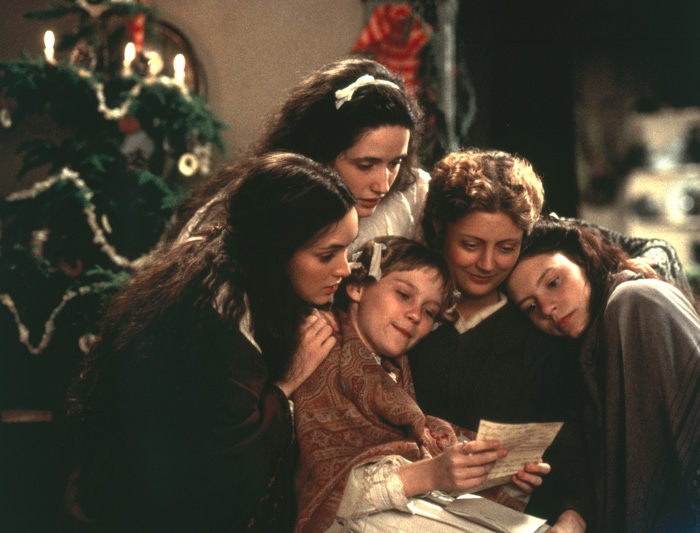IMDB
By Andrea Thompson
After I watched the 1994 adaptation of Louisa May Alcott's classic novel, it felt that a more accurate title for the film was “A Little Woman” rather than “Little Women.” Josephine “Jo” March (Winona Ryder) was always going to be the sister who stood out the most. Not only is she the author surrogate, she's also an aspiring writer who has the biggest ambitions, a lively rebellious streak, and the personality to match. She's also deeply, realistically flawed, a tomboy who is fiercely loyal to her loved ones. Already, she threatens to run away with this whole essay.
However, Alcott not only based Jo on herself, but the other sisters on her real life ones, and their adventures were drawn from much of their lives, even if they occurred earlier than the novel's Civil War setting. So Alcott lavished attention and care on each one, giving them distinct personalities and flaws that not only made them recognizable and just as relatable, but also just as worth rooting for. It's why, in spite of the novel's endless moralizing, generations of girls – and women! – have returned to it again and again. But the film doesn't show that same care and attention.
IMDB
There's certainly a lot to like about it. For one, it's directed by Gillian Armstrong, who also directed a young Judy Davis and Sam Neill in the 1979 film “My Brilliant Career.” A primarily female cast isn't enough to make a film feminist or even feminine, but Armstrong's directing prowess, and the warmth and skill of the cast and crew makes “Little Women” absolutely burst with feminine energy. When Meg March (Trini Alvarado) tells Jo, “You've ruined me!” after poor Jo burns off part of her sister's hair, we feel her pain. We laugh and ache with them as they struggle to make do with their more humble clothes when they head out to various social engagements.
The rest of the cast is also just as spot on, with Susan Sarandon as the girls' mother, whom they call Marmee, Claire Danes as the delicate Beth, a young Christian Bale as Laurie, and Gabriel Byrne as Friedrich Bhaer. Every actor who plays Jo's eventual husband has to earn forgiveness for having the audacity to marry Jo, rather than her lifelong friend Laurie. Byrne more than earns it, turning on the charm as the passionate intellectual who is supportive of Jo's ideas of equality and encourages her to write what she loves, rather than what her publishers desire. We don't have to wonder why she's drawn to him. Yet it's the decision to cast two different actresses, Kirsten Dunst and Samantha Mathis as the younger and older Amy respectively, that is the savviest. Unlike other adaptations, the film can allow the youngest March girl to act her age, and it also makes Amy's eventual romance and marriage to Laurie a lot less creepy. Even with all that, the refined Amy is the weakest link in the sisters, with her elegance being off-putting more often than not.
IMDB
Then again, it doesn't help that the entire film feels more episodic, merely skipping from one adventure to the next rather than functioning as a cohesive whole. Perhaps that's more due to sketchy editing, since screenwriter Robin Swicord did incredible work on other films, writing not only “Matilda,” but “Practical Magic.” Here it's hard to feel invested in many of the other characters, who come off as mere sketches. Meg and John Brooke (Eric Stoltz) barely share any scenes together before they start making out, and Brooke comes off more like a prig, leaving Meg's attraction to him something of a mystery. It feels more like they come together due to a mutual primness rather than an actual passion.
Amy and Laurie's courtship feels just as lifeless. Amy mentions she's considering accepting a wealthy man she doesn't love, but it never feels like she'll actually go through with it. As she and Laurie form a connection, Amy mentions she doesn't want Laurie to marry her so he can be a part of the March family, but they're so stiff together, with Amy especially coming off as remote and moralizing, that it's hard to perceive what else Laurie could see in her. Sure, he's still smarting enough from Jo's rejection of his proposal to grow a beard and drink out of a flask, but apparently a few conversations with Amy is enough to set him on the proper path.
IMDB
One of the only major events that hits home is Beth's death. Claire Danes does great work with a character that could easily come off as angelic, and she imbues Beth with enough feeling to make her recognizable as an actual person. She is unafraid of death because she realizes that her sisters must leave the home she loves and is content to remain. In the film, death becomes a way for her to go ahead of her sisters.
For this version of “Little Women,” little that Jo doesn't witness is deemed relevant. The end of the movie culminates in Jo turning its events into the novel many of us know and love. It's a good, even expected, device, but it also makes the sisters' lives even less valuable in themselves and merely fuel for the enjoyment of others. From what I've seen of the 1933 version, it seems to capture the novel better, more seamlessly transitioning to various stages in the lives of the March sisters, with Katharine Hepburn probably more accurately embodying Jo's boyishness, mischieviousness, and more masculine energy. With Greta Gerwig writing and directing a new version next year with a cast consisting of Saoirse Ronan, Florence Pugh, Emma Watson, Eliza Scanlen, Laura Dern, Timothée Chalamet, and Meryl frigging Streep, it's guaranteed to be a memorable one if nothing else.





